They can be overt, like fighting and hissing, or covert: scratching furniture or tagging clothes.
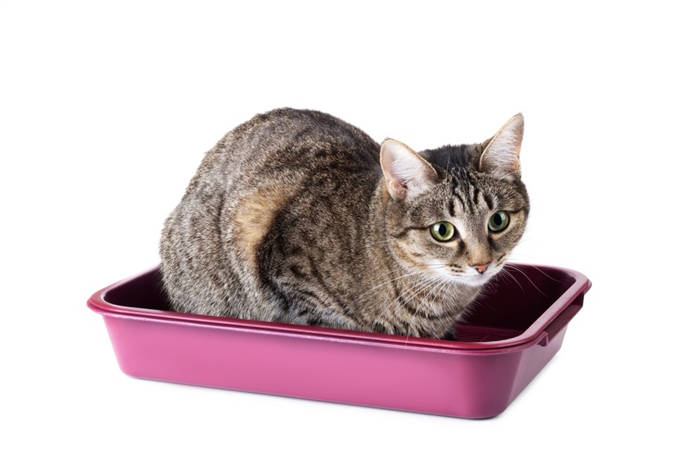
- 😾Why does the cat shit on the bed and on things, what to do about it
- Causes: Why does your cat leave puddles and puddles in the wrong places
- A story about cats and bathroom habits
- Environmental changes.
- Check the condition and location of the litter box
- Perhaps the litter box is too small?
- How to influence a cat and deal with the consequences
- Why does the kitten have to pee wherever he goes?
- Accustoming the kitty to the litter box
- Why does the kitten poop on the bed?
- How to wean a kitten from peeing on the master's bed
- Cat poops on the bed: what to do
- Preventing cat misbehavior
- What to do if a cat, cat, kitten poops at home
- Other methods
- Ignoring the litter box
- Preventive measures
😾Why does the cat shit on the bed and on things, what to do about it
What is the most important thing for a cat to live comfortably in a human home? Friendship with the litter box!
Getting your kitten accustomed to the cat litter box is an important mission for the breeder and new owner.
But it happens that even the most well-mannered and neat pet suddenly goes to the toilet directly into the owner's bed or on his clothes.
Don't rush to throw the cat out of the house, hit or scold the cat. Let's get to the bottom of this before you snap.
Causes: Why does your cat leave puddles and puddles in the wrong places
Try to determine the cause of the pet's misbehavior. This is important for solving the problem.
1. IBC/CPH/Cystitis. . Kidney stones, kidney failure or bladder inflammation are common diseases in today's cats.
The first thing to do is to rule out the disease that the cat was desperately signaling you about, peeing on the blanket. Just to be sure. So that the owner will notice his unbearable pain and save him.
Remember this, when all of a sudden you notice a strange smelly stain in bed, and it's not from juice at all.
2. fright/stress . If the cat suddenly left an unpleasant "surprise" in your bed in the form of a pile, then most likely it is something terribly frightened.
Maybe, while you are at work, the neighbor next door was working with a hammer, and she was shocked by the noise, left alone in the house.
After all, a cat's hearing is very delicate, they can hear the squeak of a mosquito outside the window, and here it is. It's the same as if we were standing under a descendant of planes flying low overhead.
Why in bed, you ask? Because the owner is a rock and a power to the little cat, he can do anything.
That's what your gentle pooch thinks. Peeing or which on the bed, the purr mixes its scent with the scent of the owner, as if to tell the enemy, lie, you won't take it!
3. wrong potty. . If Winnie the Pooh has the "wrong bees," cats have the wrong potty. What is the "wrong potty"?
It's a litter box that doesn't fit the cat either in size, construction, or just plain dirty.
For example, not all purrs like to go to corner trays (triangle-shaped), and choose regular ones.
Unwashed litter box clean cat disgusted, so she will go look for a place where her puddle or pile will not be visible, for example, in the closet with the winter clothes. Make a pile, bury it, and be done with it. She'll be discovered by winter. And now it's summer.
And such piles around the apartment can be several. And all because of the wrong or dirty litter box.
A story about cats and bathroom habits
You can train kittens to the litter box as early as three weeks old. At this time, they should become well acquainted with their personal bathroom to explore it. Cats are probably the easiest to tame because they do all the hard work for you.
By four weeks of age, most kittens are accustomed to the litter box, but this can vary a bit from cat to cat. They have a natural desire to use the potty in a place where they can easily hide their mess. Kittens usually learn the most by watching their mother.
As a general rule, cats are spotless animals who take personal hygiene very seriously. They bathe on their own, taking care of their own bodies. If you have an adult cat who has just started this behavior, you know it has nothing to do with bedding habituation.
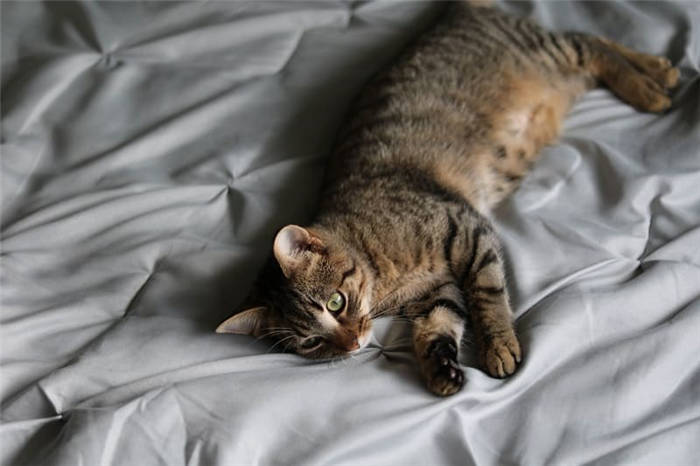
So, when your cat poops on the bed and more, it's an obvious concern because it's not normal. While problems such as urination may be due to territorial labeling, pooping has a completely different cause. And what are some of these potential causes?
Environmental changes.
Cats are creatures of habit. If something was fairly routine in your family and then suddenly changed, it can lead to bad behavior.
Sometimes your cat – like a child – can't process new information without wagering a little.
If you think back to when the problem first arose, you can think of something that changed dramatically – even if it's not that big of a deal to you. It could be something as simple as reorganizing your bedroom. It can completely change your cat, causing her to do questionable things in return.
Check the condition and location of the litter box
If that litter box is located in a busy corner of the house where you have noisy appliances such as a washing machine, clothes dryer, and the like, the noise made by such machines can interfere with your cat's concentration, causing him to seek solace outside the litter box. It is even possible that the position of the box was originally ideal for the kitty, but over the years the place has lost its appeal.
A cat who spends most of her time on the first floor with a litter box in the basement may never remember to use it; that's why it's so important to equip every floor of the house with a litter box. Undoubtedly, your cat may not want to travel long distances just to get rid of waste.
Also, although it has been found that cats can see well in low light, they need light to see. Thus, if the litter box is in an unlit part of the house, your cat may be less inclined to use it.
Of course, there are many other location problems. The poor cat may have to go through your pup's favorite resting place before she can access the litter box. And if your dog rushes to chase her along the way, she'll probably duck out of that spot entirely.
Perhaps the litter box is too small?
Check the size of your cat's litter box; is it spacious enough? It is recommended that the litter box be one and a half times the length of the cat's body, not including the tail. However, the best option is to make it as big as possible (the bigger the better).
There are some cats who don't have a preference for what kind of litter they have, but we've seen a lot of them. Not all litters are the same for them; thus, they may require one particular brand. Every cat parent needs to come to terms with the fact that the type of litter they buy is not up to them; rather, they need to consider their fur baby's preferences.
One of the ways your cat can let you know she doesn't like the litter is by peeing on the bed or anywhere else. Unfortunately, understanding your cat's toilet-filling preferences is no easy task – it takes a serious process of trial and error to determine what works best for your cat. What's worse, people who manage a home with multiple pets will need twice as much effort.
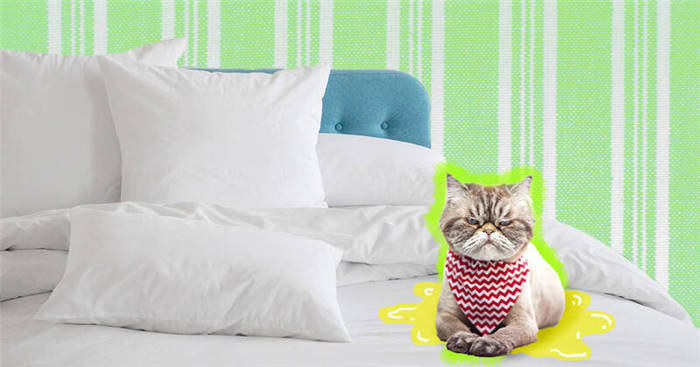
How to influence a cat and deal with the consequences
When the mishap has already happened, you need to get a grip and start dealing with the aftermath. It is no secret that the smell of cat urine is very persistent and it is extremely difficult to get rid of it permanently. The first thing to do is to wash all the bedclothes. Have the blanket dry-cleaned. If the smell remains, the pet will constantly tag the place. You can use vinegar or citric acid, which can be found in every home. Dilute with water in a 1:1 ratio, wipe the marked area. To clean a mattress you will need boric acid, salt and mineral water. Then pour salt.
Once will be enough if you notice the puddle immediately. But when the time is missed, you have to wash the shoes with soap several times. It is easier if the shoes are rag, it is enough to wash them in the washing machine. If clothes are affected, they should be washed and rinsed in a solution of vinegar (1 liter – 1 spoon). Citrus fruits can be of great help, it is their aroma that easily copes with the unpleasant smell. Also good helps are manganese, baking soda. There are special sprays and gels that can solve the problem.
Why does the kitten have to pee wherever he goes?
Before you start weaning your kitten, you need to understand the reasons for this behavior.
1) The kitten goes to the owner's bed to crap. It is not uncommon for owners to encounter a pet pooping in their bed. It is wrong to think that this happens out of spite. In fact, the kitten goes to the bed to crap because of the smell of the owner. And where it smells like its owner, the baby feels completely protected. Kitten's scent mingles with the smell of his most important protector in his life and causes a sense of calm and self-confidence.
2) Health Problems. A kitten is unable to tell its owner what's hurting it. Therefore, he tries to draw attention to himself by any means. Kitten meows quietly and uncertainly, but on the ruined carpet or bed the owner must surely pay attention. So, if a kitten knows the location of the litter box, but stubbornly ignores it, you should show it to the vet.
In any case, kittens could use an additional preventive check-up. And if he is still sick or has any abnormalities, detecting them early will help doctors to easily cope with all the problems.
3) Stress. Usually kittens get very nervous when there is yelling and fighting in the house, new animals come in, strangers come in, the pet is scolded and used physical force, furniture is rearranged or moved. Of course, you can't completely shield your baby from stress, but you can surround him with love. A caring owner gives your pet confidence and helps him calm down.
4) An inadequate litter box or its location. Cats are fussy animals that won't go where they aren't comfortable. If you find it hard for your kitten to get in and out of the tray or if you can't find room for him, you need to find another litter box. Most likely, the cat just got tired of tolerating the inconvenience and because of this began to go wherever.
Accustoming the kitty to the litter box
Another reason for the fact that the pet to cope with the toilet wherever it is, can be banal ignorance. The kitten may simply not understand what he wants. Especially if he used to live on the street. Every day the Murkosha staff teach young kittens to go to the litter box and they know all the tricks of the trade.
1. Kitten does not yet understand where to go to the litter box. He should be carried to the litter box in your arms every time he wants to go to the toilet. This is very easy to understand: the baby begins to fuss, tear the carpet with his claws and sit down. You can also limit the space for the first time (for example, to one room), so that the kitten does not have to look for the litter box. After the kitten has finished all his business, he should be praised and given a treat. This will form a reflex: if he goes to the litter tray, he'll be praised and given something nice to eat.
2. So that you don't have to follow the kitten all over the house and wait for him to go to the toilet, you can put him in the litter tray immediately after eating and gently massage his tummy. Gentle stroking mimics licking the mother cat and stimulates bowel movements. So the kitty will immediately go to the litter box and will get used to doing it here.
Why does the kitten poop on the bed?
A kitten poops on the bed – what might be the reason for this behavior? It is generally accepted that a pet arriving at a new place of residence necessarily marks the territory. And although the bed is a rather unusual place, he can also mark it.
The reasons why the kitten poops on the bed may be different. It's worth noting that the older babies are engaged in it.
And the most common is to protest. This way the pet shows its dissatisfaction. The second option: to protest against something by shitting in the owner's shoes. For example, the cat was not allowed to use the sofa wall as a scratching post and so it "took revenge" on the person.
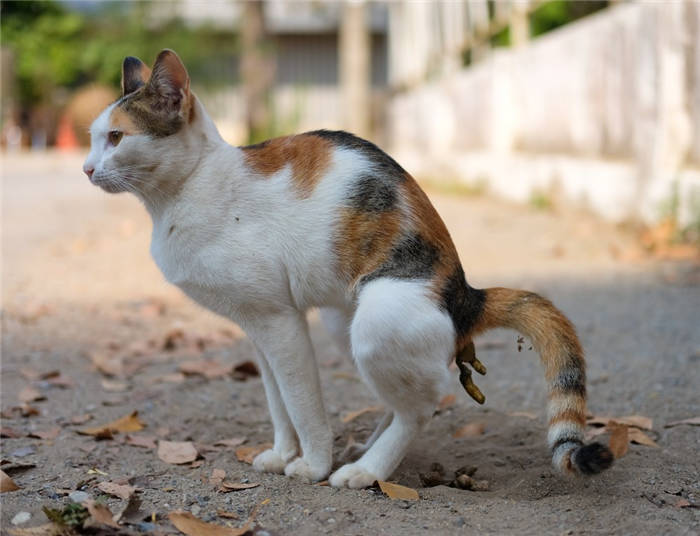
Kittens can poop the bed of the owner, being in a stressful condition. And this can be any unfamiliar situation for him. Already long-lived in the family pet can perceive the appearance of a second animal, for example, a puppy or another cat, as a competitor, depriving him of some of the owner's love. This behavior – once the pet gets used to the new friend and doesn't perceive him as a competitor – will pass. It will take some time, but it is possible that the kitten will continue to shit out of habit.
Another reason why a kitten poops on a person's bed is because it has a disease. In most situations these are pathologies of the urinary system, accompanied by painful sensations when emptying the bladder. Then the animal stops going to the litter box and shits in the soft places. He will shit not out of spite or revenge, but because of the disease.
The third reason why the kitten has crapped on the bed is due to his age. Very often people take little murziks to sleep with them.
And waking up at night, he does not immediately understand where the litter box is. And poops in the nearest place – directly on the bed. But it goes away from the place where it sleeps. This can also happen if the purrfect has played with and forgotten. The pet also "goes" to the bed and because it is afraid to jump from a height.
How to wean a kitten from peeing on the master's bed
How to wean a kitten from shitting on the bed? What can be done in this situation? First of all, you need to establish the true cause of this behavior. Beating and throwing your pet out on the street is not the answer.
It is advisable to show the pet to a qualified specialist who will appoint an examination and be able to diagnose the problem. And if the problem of using the owner's bed as a toilet is purely medical in nature, it may resolve itself after treatment.
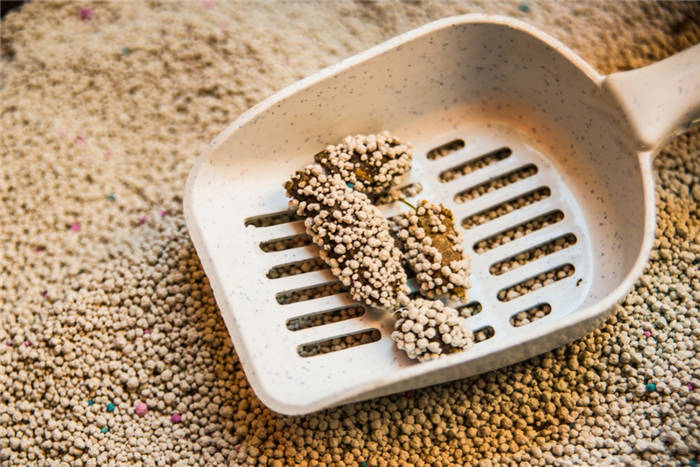
Don't put off going to the vet until later in the day in the hope that the baby will start using the litter box. The disease can progress, and the condition – and with it your kitty's behavior – can only get worse. That's why a visit to the vet is the first thing recommended in such a case.
The second method is to place several litter boxes in different places in the room at once. For backfilling it is desirable to use different fillings. It is quite possible that the cat doesn't like the smell or he prefers to go just to the net. If this method does not solve the problem either, you need to eliminate the stress factor.
The kitten begins to crap on its owners' things when it is stressed. The reason may be the arrival of a second pet in the house.
In this situation you need to wait until they get used to each other, and then it is very likely that the fluffy will begin to crap in the tray.
If the cause is stress, the kitten may be prescribed mild sedatives. But the veterinarian should choose medications that will help calm the cat's nervous system, and only after examining the cat.
Cat poops on the bed: what to do
A visit to the veterinarian will not be superfluous. An experienced specialist will help to find the cause of the undesirable behavior of the cat and quickly eliminate it with a sedative.
If the cat has pooped on the mistress's bed for the first time, you should not punish it. Physical violence will reinforce the unwanted behavior and cause the animal to become aggressive and want revenge. After finding a stink pile on the bedding, let the cat know in a stern voice how unhappy you are with its behavior. Physical punishment of the cat or cat will indicate your weakness.
Preventing cat misbehavior
Puddles and piles on the bed made by your pet are easier to prevent than to deal with. All cat or cat breeders are advised to take preventive measures in time to eliminate the use of the owner's bed as a place to go for needs. As a preventive measure, we can recommend:
- Covering the door to the bedroom tightly, restricting animal access;
- Spray the bed with essential oils of lavender, lemon or orange, the smell of which disgusts cats and can therefore be used as a deterrent;
- Keep the cat's litter box clean and do not change it or the litter box litter box without reason.
Proper owner behavior and timely action will quickly eliminate the problem of puddles and piles on the bed left by the cat or cat. Your pet will once again be a good little pooch. If you can't solve it yourself, ask your veterinarian for help.
What to do if a cat, cat, kitten poops at home
It should be noted at once that if the cat shits in the hidden corners of the apartment, spoils the property, personal belongings, once the root cause of this behavior is identified, weaning the pet from destructive manners will take some time. If a cat, cat, kitten poops, stock up on patience. Do not apply physical force, painful influence to the animal. Such an approach can only aggravate the situation and the beloved pet will do evil things.
Observe the pet carefully. Study your pet's mannerisms. Look at where the cat prefers to do its "business". Cover access to hard-to-reach areas that the pet has chosen to use toilets. If the cat poops on the carpet, change the carpeting.
If the cat poops, restrict the cat's movement around the apartment until the cat goes to the litter box. Lock the fluffy cat in a room and put a litter box with sand and litter filler in it. Provide fresh drinking water, cat food. After three or four days of isolation, the cat should develop a proper conditioned reflex.
Put three or four litter trays of different shapes and sizes in places that you know the cat likes to use for its toilet. If the cat constantly craps, try to use different fillings. Leave one of the trays without sand and put a lattice on top. Most cats prefer fine-grained loose compositions in which you can dig. Watch what kind of toilet, and with what kind of filler the cat will choose. As soon as the pet starts going to the same litter box all the time, remove the rest, gradually moving the cat's litter box 40-50 cm daily to the right place.
If an adult cat, a kitten, a cat poops, but the pet appeared to you recently, be sure to ask the previous owners, breeders, what was used filler. Buy in advance everything you need for the care and maintenance of the cute fluffy cat.
If the pet goes to the litter box as intended, be sure to encourage it with an affectionate tone, a favorite treat. This will help form positive associations with the cat's use of the litter box. Do not distract or frighten the cat when he or she goes to the litter box.
Other methods
Cats naturally have an excellent sense of smell. At the same time, there are scents that attract or, on the contrary, scare away the cute fluffy cat. This feature can be tried to apply if the cat began to poop anywhere in the apartment.
If the cat poops, use repellent, unattractive scents for cats:
Cats do not like the smell of lavender, rue, thyme, lemongrass. A cat cannot tolerate essential oils, the scent of citrus fruits, and vinegar essence. If a cat, kitten, cat poops, does not want to go to the toilet on its litter box, place in the "favorite" places the inflorescences of fragrant plants, pieces of lemon, orange peel, lavender balls. Prepare a tincture based on the onion husk, garlic, wormwood. Spray the mixture into a sprayer, spray in corners and other secluded places in the apartment where the cat poops.
Wipe places where the cat craps with vinegar, bleach, concentrated solution based on laundry soap. Treat all corners with strongly smelling deodorizing agents. Such scents should discourage the cat from going to the bathroom where he wants.
Pet stores, drugstores sell aerosols, sprays, fillers, which have an attractive fragrance for cats. Perfumed compounds will help develop the right conditioned reflex in fluffy purrs. The cat will go to the toilet to the smell that attracts it.
If the cat, cat, kitten, cat poops, you can use the gastronomic method. Place bowls of food and tasty treats where the pet goes to crap. Cats will never crap where there is food.
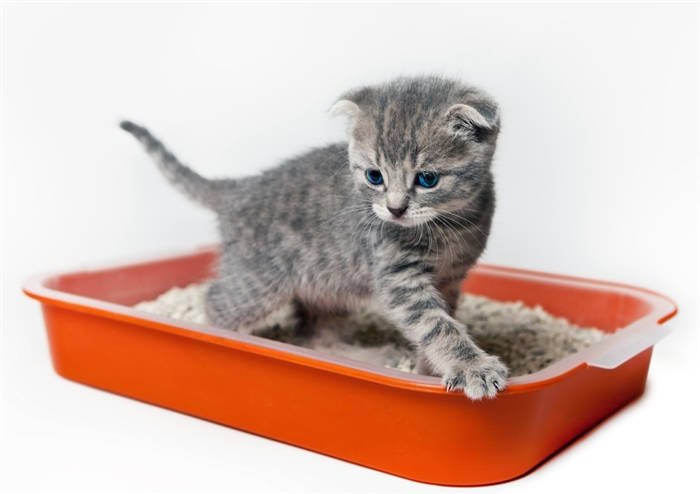
The above methods did not help? Cat, cat poops, perhaps the reason for the untidy behavior lies in diseases of the genitourinary tract. Noticing that the pet is experiencing pain, discomfort when trying to go to the toilet, frequent urge to urinate, other side uncharacteristic symptoms is worth seeking help from a vet clinic.
Ignoring the litter box
It's not very common for a cat to poop on the bed instead of going to the litter box. She is more likely to choose a more secluded place just to go to the litter box. Nevertheless, it is possible. You'll have to figure out why the cat doesn't like the litter box, and eliminate the cause. Maybe the litter box just needs to be cleaned – cats are very clean, many of them simply can't go to the toilet if their toilet is not cleaned. Or the litter box should be moved to another, more suitable place (maybe in the same place the cat was afraid of the noise or the constant "thoroughfare"). Or maybe the pet was uncomfortable with the shape of the litter tray or do not like the filler. But all of these problems are easy to solve.
This can be considered a variety of problems with the litter box, but we'll still separate these causes into a separate group. Sometimes going to the litter box, or even just doing her natural needs, causes pain for the cat. Then she may start looking for soft surfaces to do it on. The owner's bed is just perfect. Moreover, if we are talking specifically about the bed, painful sensations are much more often the cause of unpleasant "surprises" than other possible problems with the litter box. It is necessary to show your pet to a veterinarian, only he can confirm or deny the presence of diseases and, if necessary, prescribe treatment. If there are no medical abnormalities, it must be a behavioral problem (stress, lack of attention, unwillingness to go to the litter box for some reason).
Finally, in old age (15 years and older) the cat's memory fails, it can go to the bed, because it does not remember where exactly it should go, and it just focuses on the smell of the owners. In this case it is difficult to do something, you just need to be patient or buy special diapers for animals.
Preventive measures
Regardless of why exactly the cat started to shit the bed, the owner still needs to somehow cope with the situation. In this case, in addition to the measures listed above, the following method will help. Cats do not like harsh odors, especially lavender and citrus scents. So the bed can be sprinkled with lavender, orange or lemon essential oil. Smelling this will make the cat hesitate to come near the bed and crap on it.
So, the cat can shit on the bed when he feels insecure in the house and wants to mix his smell with the master's (you should stop scolding the cat, show him your care, play more often and give him treats), or when he marks his territory (only neutering will help), or when he does not want to or cannot go to the litter box for different reasons – most often because of health problems or old age (you must show him to the vet).
In conclusion, "Murkoshi" team wants to say that no matter how unpleasant the problem is, it can always be solved, you can always make contact with a pet, if you love him, be patient, encourage him for good deeds and never hurt him!






